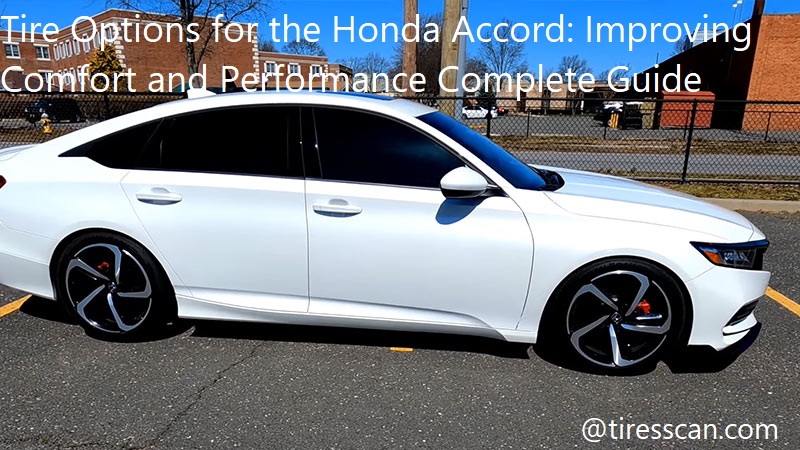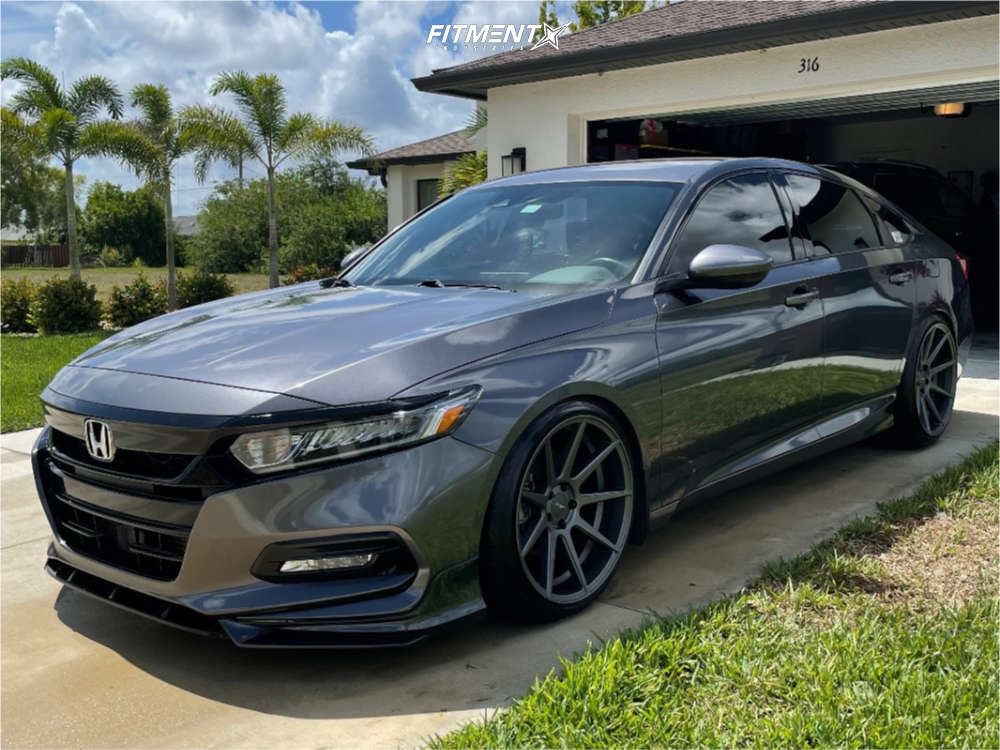Finding the right tires for your vehicle may feel overwhelming, but with the right research and guidance, you can make an informed decision to improve your Honda Accord’s performance and comfort.
In this guide, we’ll break down the different tire options available for the Honda Accord so you can hit the road with confidence.
Choosing the right tire for your Honda Accord is essential to ensuring optimal comfort and performance. There are a variety of tire options available, ranging from entry-level economy tires to high-performance tires designed for use on challenging terrain. This guide provides an overview of these different tire options and what they can offer to improve comfort and performance when driving the Honda Accord.
It is important to remember that the type of tire you choose will depend on a number of factors, including road conditions, weather conditions, and most importantly, your individual driving style. Accordingly, before making any decisions about what type of tire to get for your Honda Accord, it is important that you understand all the available choices and their respective benefits.
Importance of tire selection for Honda Accord
Selecting the right tires for your Honda Accord is essential for ensuring a comfortable and safe ride. The impacts of road conditions, climate, and even your individual driving style can affect steering and braking as well as handling stability, so it is important to choose the right tires for improved comfort and performance.
In addition to the varying conditions that you may encounter while driving a Honda Accord, there is also a wide range of tire types and brands available on the market today. This guide provides information on how to select the best tires for your car’s make and model in order to maximize its safety, comfort, performance, fuel efficiency, traction control, tread life, noise levels, and overall value.

Choosing the Right Tire for the Honda Accord
When it comes to choosing the right tire for your Honda Accord, it is important to consider the level of comfort and performance needed from your tires. Your decision will be based on several factors, including your driving habits, the season you drive in, and the weather that you are likely to encounter.
The most important factor to consider when selecting tires for the Honda Accord is knowing what type of vehicle you are buying tires for. For example, if you want the utmost comfort for your Accord, then a Grand Touring radial tire is a great option; however, if performance and cornering ability are a higher priority than comfort then an All-Terrain radial should do the trick.
Further considerations should also include taking into account individual driving habits and needs such as terrain coverage requirements and desired traction control technologies like run-flat tires or all-season treads. Ultimately though, knowing where and how you plan on using your Honda Accord will allow you to find the perfect match of tire that meets all of your needs while ensuring optimal efficiency and reduced wear.
All-Season Tires
All-season tires are designed to provide a good balance between comfort and performance for the Honda Accord. All-season tires are able to maintain traction in a wide range of conditions, so they’re ideal for everyday use.
All-season tires typically have tread patterns that provide better wet traction than summer tires, and some include zigzagging sipes that offer good snow traction. All-season tires also have wide circumferential grooves that help evacuate water quickly to reduce hydroplaning risks.
When selecting all-season tires for your Honda Accord, it is important to choose tires with the right speed rating, load rating, and width based on your vehicle’s specifications.
Performance Tires
Performance tires are designed to enhance the grip and handling of your Honda Accord. These types of tires are made with a specialized rubber compound that performs well in both dry and wet conditions. In addition, they feature a tread pattern designed to improve grip on corners and crisp handling during sudden lane changes. Performance tires usually come with increased tread life compared to standard all-season tires, meaning they will last longer as long as you take proper care of them.
When shopping for performance tires, always consult your vehicle’s manufacturer for recommended tire sizes and load ratings for your specific Honda Accord model. This information can help you make an informed decision when selecting a tire that meets your performance needs while ensuring proper fitment on the car itself. Performance tires can vary greatly in terms of price and features, so be sure to compare the different solid options available before making a purchase.
Improving Comfort and Performance with Tires
The right tires could make a world of difference in the comfort and performance of your Honda Accord. Driving in the rain or snow, going around tight turns, or strapping down the car for maximum performance – these are all circumstances where having the right tires can make all the difference. But with so many options available, it can be confusing to decide which is best for your situation.
Let’s look at few tire options that could improve your comfort and performance when driving a Honda Accord. Some considerations are type of terrain you’re likely to encounter, climate conditions you’ll face, and how much use you plan on getting out of them. All-season tires provide a great balance between both highway and off-road driving. They are less expensive than other types but will not offer as much ruggedness or grip when compared to more specialized terrains.
For warmer climates, summer tires might be the most ideal option for those who expect regular use on highways and roads that may experience heavy rain or dampness. Summer tires have superior grip thanks to their large contact patch area with dry roads; however they may perform less efficiently during winter due to its lack of snow traction abilities which makes them unreliable in colder temperatures below 7°C (45°F).
For those looking for maximum performance coupled with durability, performance tires such as UHP (ultra-high-performance) tires may be worthy investment — especially on cars used mainly on highways or wetter climates. These types of tread have a stiffer outer surface that acts as an excellent cushion during dry pavement driving and enhances control when going around curves or sharp turns at lower speeds. Additionally these kinds of tire come equipped with deep channels for handling slushy road surfaces found around winter season times — providing additional stability even at higher speeds when it counts most!
How tires impact comfort and performance
Despite the Honda Accord’s reputation for dependability, most drivers may not appreciate just how much their decision regarding tires influences their overall experience. Quality tires help ensure increased safety and a much smoother ride in any vehicle, and the Honda Accord is no different. The type of tire chosen for your Accord will have a distinct effect on the overall comfort and performance of the car.
Thus, it is important to do some research when you select your tires. Allowing yourself time to shop around to find a tire that meets your needs is key to obtaining improved comfort and performance with an A+ grade ride quality. Apart from providing optimum levels of safety and stability, tires can be chosen for other reasons too; such as improving fuel efficiency or off-road tracks or increasing speed ratings or cornering etc
When shopping for improved comfort and performance tires in particular, there are two major sources that should be considered – either from retailers or from online stores. Locally, retail stores will be able to offer advice around buying the correct type of tire for your vehicle based on local terrain conditions. Online shops are becoming increasingly popular due to their extensive selection options and can often offer great discounts when it comes to larger bulk buys; but prices can vary considerably depending on the brand chosen, so comparison shopping should always apply here. Additionally, some stores may offer mounting services so parts don’t need to be purchased separately if you are seeking fitting with purchase as well as secure shipping options should delivery also need to be considered when selecting your replacement set of tires.

Ways to improve comfort
- Ways to improve comfort: Car tires are a fundamental part of the driving experience. While all Honda Accord LX models come with all-season tires, there are many options available to improve comfort and performance. Whether your goal is maximum comfort, optimal performance in various conditions, or even just saving some money, there’s something out there for you.
All-Season Tires: All-season tires offer reliable performance and ride comfort in most regular road conditions year round. They also provide good fuel economy as they require less energy to move your car thanks to their low rolling resistance design. They’re designed to take on moderate snow or rain conditions but not extreme winter weather or off-road terrain.
High Performance Tires: High performance tires provide enhanced grip for cornering at higher speeds and the best possible traction in wet or dry road conditions. They also provide precise steering response and eliminate hydroplaning due to their unique tread design. These tires offer excellent cornering stability and responsive handling, making them ideal for driving enthusiasts who want more control over their vehicle’s behavior on the road. Unfortunately, they tend to have a shorter life span so regular tire rotation is necessary for optimal performance over time.
Winter Tires: Winter tires are specially designed to provide superior traction and grip on slippery surfaces such as ice and snow—covering ground that all season and high performance tires can’t handle safely. Although these tires tend to be more expensive than all season ones, they can be worth the extra money if you find yourself frequently driving in icy or snowy conditions during the winter months.
Maintenance and Care of Tires
Maintaining and caring for your car’s tires is an important step in ensuring safety and a smooth ride. Tire maintenance includes proper tire inflation, regularly checking tread depth, rotation, and alignments for front and rear tires.
Tire Inflation: Tire pressure should be checked monthly with a reliable air pressure gauge. Honda recommends maintaining the specified tire inflation pressure outlined in the owner’s manual to maximize tire life and performance on the street. Underinflated or overinflated tires can lead to irregular tread wear or even internal damage which can lead to blowouts.
Tread Depth: Checking tread depth is important to make sure they have enough grip on the roads. Tires with insufficient tread depth can result in decreased traction on wet or icy roads as well as higher rolling resistance resulting in reduced fuel economy. Tires with sufficient tread have 2/32 of an inch of remaining thread depth with light wear across the center rib found by inspecting the tire’s surface from a standing height at eye level.
Rotations: Rotating your car’s four tires every 7,500 miles will help them wear more evenly reducing overall cost over time. Typically, front-wheel drive vehicles need more frequent tire rotations than rear-wheel drive vehicles because their weight skews toward the front of the car resulting in quicker wear on front tires than back tires. Most drivers turn their wheels only when getting new sets of rubber but rotating them regularly is advisable to increase their longevity no matter if you choose all-seasons or a set comprised of two summer/two winter options.
Alignments: Regular wheel alignment ensures even contact between all four tires and reduces premature tire wear while helping you keep precise control while maneuvering around tight corners and sharp turns at higher speeds during regular city driving or out on highways over long distances which ultimately provides your Honda Accord with superior performance both at low speeds or when pushed harder out onto country roads off limits by other driver vehicles who usually fall behind helplessly due to engine limitations!
Importance of tire maintenance
Tire maintenance is essential to ensure the safety and performance of any vehicle. Proper tire care maximizes fuel efficiency, improves your vehicle’s overall handling, and increases its lifespan. Neglecting tire maintenance leads to premature wear and tear, risking unsafe driving conditions on the road. The Honda Accord has specific tire requirements for optimal performance, making it important to understand these needs before making a decision about tires.
A few things to consider when choosing the right tires for your Honda Accord include tread-patterns, tire composition, road conditions in winter weather, All-Season vs All-Terrain tires, mileage ratings and speed ratings. Understanding various aspects of tire care can help you make an educated decision that will allow you to maximize the comfort and performance of your vehicle while also protecting against unforeseen risks on the road such as skidding in slippery conditions.
This guide aims to shed light on these essential aspects to ensure a safe driving experience with improved ride comfort.
Recommended maintenance schedule
Regular maintenance is essential for preserving the performance, safety and efficiency of your tires. Following a comprehensive maintenance schedule recommended by Honda will ensure that your tires continue to serve you reliably for many years to come. Here are some of the most important points in Honda’s tire maintenance schedule.
– Inspect all tires at least once a month for tread wear, bulging, and cracking.
– Have the wheel alignment of your Accord checked at least once a year or every 12,000 miles, whichever comes first—even if no tire has been replaced or damaged.
– Check axle angles and wheel balance quarterly or every 6,000 miles (whichever comes first).
– Check wheel weights quarterly or when a wheel alignment is needed.
– Rotate your Accord’s tires at least every 5,000 to 7,500 miles (whichever comes first) following the factory recommended pattern. Make sure to check the rotation patterns whenever new tires are installed on one side or both sides of the vehicle as differences in diameter can affect tire balance and direction rotation needs to be adjusted accordingly.
– Check tire pressure levels at least once per month: tires lose 1 psi (pound per square inch) for every 10 degrees Fahrenheit drop in temperature—and an underinflated tire decreases fuel economy and increases rolling resistance which may also lead to uneven tread wear patterns due to excessive heating from contact patch squirm caused by excessive overloading on one edge of the contact patch versus another caused by underinflation; thus likely causing earlier irregular wear than expected and leading further premature replacement than originally anticipated for efficient performance and prolonged life span expectance from Honda Accord tire options.

Conclusion
This guide has provided useful information on the different types of tires available for the Honda Accord. All tires help improve comfort and performance to some degree, but each type comes with pros and cons based on various factors such as budget, driving habits, environment, and more.
Soft Compound tires are great for smooth road surfaces and wet weather conditions but tend not to last as long as Hard Compound tires. High-Performance tires provide excellent grip under acceleration, braking and cornering but can lead to increased wear due to their stiffer nature. All-Season tires are a good option for all-round use but tend to be less efficient in extreme temperatures. Finally, Touring tires offer a great mix of comfort and performance without sacrificing too much tire life or ride comfort.
Ultimately, the type of tire that is best suited to your Honda Accord will depend on your driving habits, environment and expectations. The right choice will improve your car’s driving experience in all conditions while also providing good long-term value for money.
FAQs
What is the best tires for a Honda Accord?
The best tires for a Honda Accord may vary depending on personal preference and driving conditions, but some recommended options are Michelin Pilot Sport A/S 3+, Continental PureContact LS, and Bridgestone Potenza RE980AS.
How can I improve my Honda Accord performance?
There are several ways to improve Honda Accord performance, such as upgrading the exhaust system, installing a performance air intake, and adding a performance chip or tuner.
What tire does Honda recommend?
Honda recommends several tire options for their vehicles, including Michelin, Bridgestone, Goodyear, and Continental.
What can you add to a Honda Accord to make it faster?
Some options to make a Honda Accord faster include upgrading the air intake system, installing a performance exhaust system, and adding a turbocharger or supercharger.
What is the best performance tire on the market today?
There are several top-performing tires on the market today, including Michelin Pilot Sport 4S, Continental ExtremeContact Sport, and Bridgestone Potenza S-04 Pole Position.
Which tire gets the most wear?
The front tires usually get the most wear on a front-wheel-drive vehicle like the Honda Accord.
What is the best years for a Honda Accord?
Some of the best years for Honda Accord include 2013, 2014, and 2015, as they offer a good balance of reliability, performance, and features.
What is the most common problem with Honda Accord?
One of the most common problems with Honda Accord is transmission issues, particularly with the automatic transmissions in certain model years.
What is Eco boost on Honda Accord?
Eco boost on Honda Accord is a driving mode that prioritizes fuel efficiency by adjusting the engine and transmission settings to reduce fuel consumption.
Which tire is better quality?
The quality of tires may vary depending on brand and model, but some top-quality options include Michelin, Continental, and Bridgestone. It’s best to choose a tire that fits your specific driving needs and conditions.
See Also:
- Best Tires For Wet Roads
- Best Tires for Hyundai Elantra
- Best Tires For Toyota Highlander
- Best Tires For Toyota Corolla
- Best Tires For Toyota Camry

